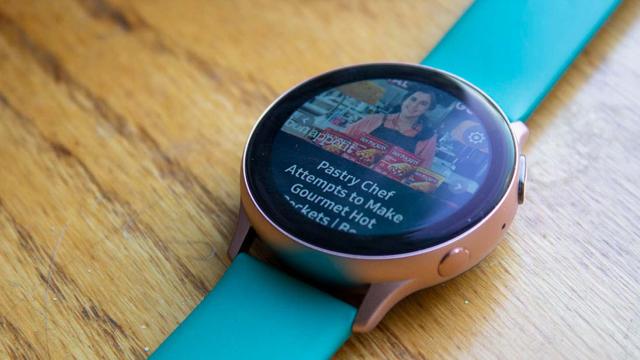Earlier this week, Google announced it was partnering with Samsung to create a unified Wear OS-Tizen platform. It’s a bold move that could up-end the smartwatch landscape, and the next Samsung watches may be the first to offer the new Wear-Tizen mash-up experience.
There’s been a steady stream of rumours and leaks surrounding the next-gen Samsung watches, which are expected to be the Samsung Galaxy Watch 4 and Galaxy Watch Active 4. Most of the discourse until now has centered around whether Samsung would really shift from its own Tizen OS to Wear OS — and now we know the answer. But the most recent leak reveals yet another hurdle that could throw a wrench in this whole Wear-Tizen mashup.
Noted leaker Ice universe (via TechRadar) claims the Galaxy Active 4 will run on the new Wear platform and sport 2D glass and a narrower bezel. But the potentially bigger deal is the new 5-nanometre processor that the new watch might run on.
Processor talk can make even the most dedicated tech nerds’ eyes glaze over, but for our purposes, know that 5nm nodes pack in more transistors than Samsung watches’ current 10nm Exynos chips, which will make them more powerful and more efficient. We don’t know what the chip’s performance will be like yet, but it could signal better battery life and innovative health features. In particular, the next Samsung watches are rumoured to support non-invasive blood glucose-monitoring. (Though, there are more logistical reasons why that feature probably won’t debut this year, even if the hardware supports it.)
Wear OS gets a lot of flack, but a large part of it has nothing to do with Google. Wear OS watches have been hampered by the fact that the processor they run on, Qualcomm’s Snapdragon Wear chipset, has been hamstrung from day one. The Snapdragon Wear 2100 chip was outdated when it launched in 2016 and didn’t get updated for two years. The next chip, the 3100, came in 2018 and brought some improvements thanks to the addition of a co-processor, but still used outdated 28nm process tech. For reference, 28nm process tech debuted in 2011, and in 2021, almost every Wear OS watch has a 28nm Wear 3100 chip.
That brings us to the Snapdragon Wear 4100/4100+ platform. Qualcomm launched it last year and at 12nm, it is a significant jump in processing power (but still several years out of date). Worse yet, a year after launch only the Mobvoi TicWatch Pro 3 uses it. Sure, companies took some time to switch from the 2100 to the 3100, but not this long.
If it’s true that Samsung’s next watches feature a 5nm chip, and if these watches are great, the Wear platform could be a huge hit. That’s genuinely exciting. But if other Wear watches run on Qualcomm’s outdated chips, the new platform might not offer a good experience for any other watches but Samsung’s.
One major advantage that Wear has over the Apple Watch is that it’s not limited to a single brand or ecosystem. iOS and Android users can both use Wear OS watches, and now that Samsung is on board, the Galaxy Watches’ best features may not be limited to Samsung phone users. But that also means the field for full-featured flagship smartwatches might still be just Samsung vs. Apple. (At least until Fitbit gets into the Wear OS game.)
Android users deserve good smartwatches and lots of them. This unified platform is honestly the most meaningful and exciting news we’ve seen for Wear OS in a long time. It has the potential to offer an incredibly diverse set of watches and apps that go beyond closed company ecosystems. But Qualcomm needs to step it up to ensure that new Wear OS watches aren’t held back by processor problems.
